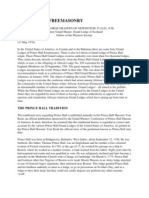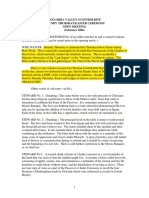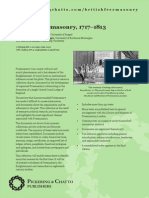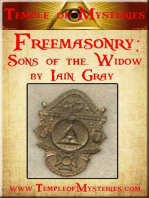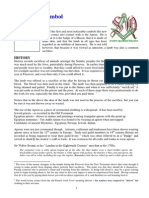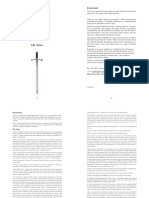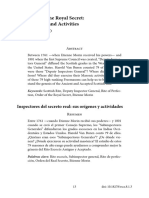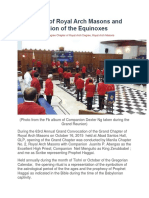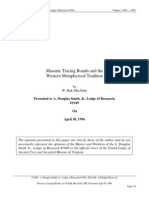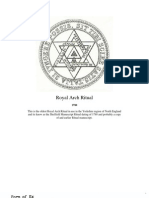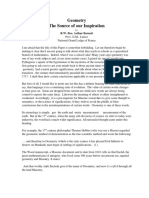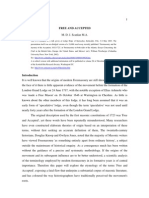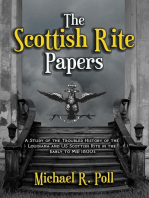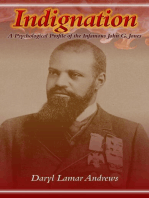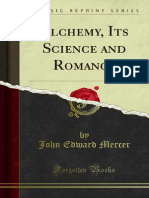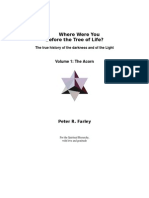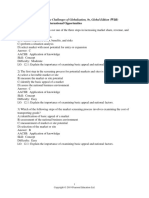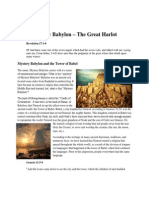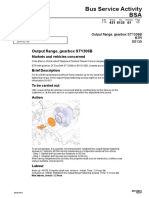The
Temple
Legend
A
Challenging
Alternative
Presented
at
Oracle
Lodge
1003
on
8
th
March
2004
by
Bro.
Paul
Kenny

The
Temple
Legend:
A
Challenging
Alternative
Introduction
This
evening,
I
would
like
to
present
to
you
a
version
of
the
Temple
Legend
that
few
Brethren
will
have
heard
before.
While
similar
in
many
respects,
it
presents
challenging
differences
that,
whether
correct
or
not,
are
nonetheless
insightful.
The
presentation
constitutes
what
is
hoped
to
be
the
beginning
of
a
more
detailed
study
of
the
Temple
Legend
in
both
Masonic
and
Non
‐
masonic
writings.
It
is
based
on
a
lecture
given
by
Rudolf
Steiner
in
Berlin
on
4
th
November
1904
and
published
under
the
title
The
Temple
Legend:
20
Lectures
by
Rudolf
Steiner
,
published
by
Rudolf
Steiner
Press.
Steiner
is
best
know
for
his
associations
with
Theosophy,
his
own
School
of
Anthroposophy
and
such
applications
of
his
knowledge
as
Steiner
(or
Waldorf)
Schools,
biodynamic
agriculture
and
even
the
labour
movement
just
to
mention
a
few.
While
open
to
criticism
for
a
lack
of
rigour
in
the
presentation
of
his
ideals
and
beliefs,
he
was,
undoubtedly,
an
incredibly
knowledgeable
and
insightful
man
if
not
an
unacknowledged
genius
Many
legends
contain
esoteric
truths
in
the
form
of
images
and
associated
symbology
and
allegory.
Steiner
believed
that
these
were
given
to
man
in
this
form
at
a
time
when
he
was
not
mature
enough
to
receive
the
truths
directly.
These
pictures
took
hold
of
man’s
causal
body
(that
part
of
man
which
bore
the
germ
of
his
future
higher
being)
and
thus
made
him
ready
to
understand
the
truths
directly
in
a
future
incarnation.
One
such
Legend
will
be
familiar
with
all
Master
Masons
and
yet
differs
in
a
number
of
details
which
we
will
revisit
once
the
Legend
has
been
told.
The
version
told
here
is
that
believed
to
have
been
left
by
an
enigma
of
the
17
th
Century
‐
Christian
Rosenkreutz,
for
the
Brethren
of
the
ʹ
Fraternitae
Rosae
Crucis
ʹ
or
the
Brotherhood
of
the
Rose
Cross.
While
many
believed
this
Brotherhood
to
have
been
an
elaborate
hoax
at
a
time
of
religious
and
political
turmoil
in
Europe,
others
firmly
believe
that
it
did
exist
in
the
form
of
the
‘Invisible
College’.
Regardless,
the
legend
about
to
be
retold
and
many
other
texts
associated
with
the
Rosicrucians
hold
much
knowledge
worthy
of
study.
Characters
such
as
Francis
Bacon,
Robert
Fludd,
Sir
Christopher
Wren,
Dr.
John
Dee
and
Elias
Ashmole,
among
others,
all
studied
the
Rosicrucian
texts.
Many
of
these
also
played
significant
roles
in
the
development
of
Freemasonry
during
the
17
th
and
18
th
centuries.
As
it
is
in
Freemasonry,
so
it
was
in
Rosicrucian
circles
that
this
Legend
was
only
to
be
shared
within
the
closed
group
of
the
initiated.
The
Temple
Legend
There
was
a
time
when
one
of
the
Elohim
created
a
human
being
whom
he
called
Eve.
That
Elohim
united
himself
with
Eve
and
she
gave
birth
to
Cain.
After
this,
another
Elohim,
named
Yahveh,
created
Adam.
Adam
also
united
himself
with
Eve
and
from
this
union
came
Abel.
(Thus
we
see
that
Cain
is
a
direct
descendant
of
the
gods,
but
Abel
is
a
descendant
of
Adam
and
Eve
who
are
human.
Now
the
myth
proceeds.)
The
sacrifices
that
Abel
made
to
Yahveh
were
pleasing
to
him,
but
the
sacrifices
brought
by
Cain
did
not
please
him
because
the
birth
of
Cain
was
not
ordained
by
him.
The
result
was
that
Cain
committed
fratricide.
He
killed
Abel
and
for
this
he
was
excluded
from
communion
with
Yahveh.
He
went
away
into
distant
lands
and
founded
his
own
race
there.
Adam
again
united
himself
with
Eve
and
from
this
union
came
Seth,
also
mentioned
in
the
Bible,
who
took
over
the
role
of
Abel.
Thus
we
have
two
generations
of
mankind:
the
race
of
Cain,
who
was
a
descendant
of
Eve
and
of
the
Elohim,
and
the
other
race
which
had
human
parentage
and
was
brought
into
existence
at
the
command
of
Yahveh.
Among
the
descendants
of
Cain
are
all
those
who
have
been
creators
of
art
and
science,
as,
for
instance,
Methuselah,
the
inventor
of
the
Tau
script,
and
T….
C…,
who
taught
the
use
and
working
of
metal
ores
and
iron.
In
this
line
of
descent,
stemming
from
the
Elohim,
were
all
those
who
trained
themselves
in
the
arts
and
sciences.
Hiram
also
descended
from
the
race
of
Cain,
and
he
was
the
inheritor
of
all
that
had
been
learned
by
the
others
of
his
line
in
technology
and
art.
He
was
the
most
significant
architect
we
can
imagine.
Out
of
Seth
ʹ
s
line
came
Solomon,
who
excelled
in
everything
that
came
from
Yahveh.
He
was
endowed
with
the
wisdom
of
the
world
and
all
the
attributes
of
calm,
clear,
objective
wisdom.
This
wisdom
can
be
expressed
in
words
that
go
straight
to
the
human
heart
and
can
uplift
a
person,
but
it
is
unable
to
produce
anything
tangible
of
a
technical
nature,
in
art
or
science.
It
is
a
wisdom
which
is
a
directly
inspired
gift
of
God
and
not
attained
from
below
through
human
passions
welling
up
from
the
human
will—that
would
be
the
wisdom
pertaining
to
the
sons
of
Cain,
a
legacy
of
the
other
Elohim,
not
Yahveh.
They
are
the
hardworking
industrious
ones
who
seek
to
accomplish
everything
through
their
own
efforts.
Solomon
now
decides
to
build
a
temple
and
calls
upon
Hiram,
the
descendant
of
Cain,
to
be
his
master
builder.
It
was
at
the
time
when
Balkis,
the
Queen
of
Sheba,
was
visiting
Jerusalem
because
she
had
heard
of
the
wisdom
of
Solomon.
And
she
was
certainly
impressed
and
charmed
by
the
exalted
and
clear
wisdom
and
beauty
of
the
King
when
she
first
arrived,
and
when
he
made
love
to
her
she
consented
to
be
his
bride.
Now
she
heard
about
the
temple
which
was
being
built
and
she
desired
to
make
the
acquaintance
of
the
master
builder,
Hiram.
When
she
first
met
him
she
was
captivated
merely
by
his
glance.
As
a
result,
a
certain
mood
of
jealousy
arose
between
Hiram
and
Solomon
and
the
latter
wished
to
do
something
or
other
against
Hiram,
but
he
was
dependent
upon
him
for
the
completion
of
the
temple.
Now
came
the
following.
The
temple
was
almost
complete.
Only
one
thing
was
still
lacking,
which
was
to
have
been
Hiram
ʹ
s
masterpiece;
that
was
the
Molten
Sea,
which
was
to
represent
the
ocean
cast
in
bronze
and
was
to
have
adorned
the
temple.
All
the
necessary
mixtures
of
ores
had
been
prepared
by
Hiram
in
a
most
wonderful
manner,
ready
to
be
cast.
Now,
however,
three
apprentices
got
to
work,
whom
Hiram
had
found
so
lacking
in
skill
that
he
had
been
unable
to
promote
them
to
become
masters.
They
had
therefore
sworn
to
be
revenged
on
him
and
desired
to
prevent
the
casting
of
the
Molten
Sea.
A
friend
of
Hiram,
who
got
to
know
about
these
plans,
confided
them
to
Solomon,
so
that
he
should
prevent
their
realization.
But
Solomon,
through
jealousy,
did
nothing
to
stop
them,
because
he
wished
to
destroy
Hiram.
The
result
was
that
Hiram
had
to
look
on
while
the
whole
casting
disintegrated
due
to
the
addition
of
a
wrong
ingredient
in
the
mixture
by
the
three
apprentices.
He
tried
to
quench
the
bursting
flames
by
pouring
water
over
them,
but
this
only
made
matters
worse.
Just
as
he
was
on
the
point
of
despairing
about
the
work
ever
being
completed,
T….
‐
C…,
his
ancestor,
appeared
to
him
and
told
him
that
he
should
not
hesitate
to
cast
himself
into
the
fire,
as
he
was
invulnerable
to
the
flames.
Hiram
did
as
he
was
advised
and
came
to
the
centre
of
the
earth.
He
was
led
by
T….
‐
C…
to
Cain,
who
there
resided
in
a
condition
of
pristine
divinity.
Hiram
was
thus
initiated
into
the
Mystery
of
Fire
and
into
the
secret
of
bronze
casting,
receiving
from
T….
‐
C…
a
hammer
and
a
golden
triangle
which
he
was
able
to
carry
with
him
as
a
pendant
round
his
neck.
Then
he
returned
and
was
able
to
complete
the
casting
of
the
Molten
Sea
and
to
put
everything
in
order
again.
Hereupon
the
Queen
of
Sheba
consented
to
become
Hiram
ʹ
s
bride.
He,
however,
was
set
upon
by
the
three
apprentices
and
murdered.
But
before





